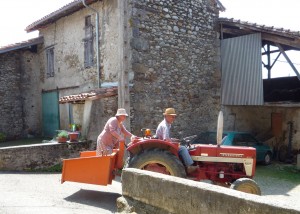I am sure I am not the only one drawn to Estate Agent’s windows whenever I visit a new country or region; of course houses are my business so perhaps I have more interest than most but I think many of us are fascinated to see the different sorts of property for sale in other places and the prices that are being asked. This is of course why estate agents put their most photogenic and seemingly best value properties in their windows – a sort of juicy worm to hook people in. But I know by experience how very misleading such properties and prices can be – it is the same on the internet with beautiful shots of tightly cropped and apparently very cheap houses for sale giving the impression that property in France is as cheap as chips. Well property in this region is certainly very good value but I think that many people window shopping for houses this summer are likely to be disappointed if they are thinking that they will be able to pick up something for almost nothing and, if it looks too good to be true, more often than not, it will be.
Although it has now become a buyer’s market in France, there is as yet no general agreement that the reduction in the level of sales will be accompanied by any major collapse in prices and the general strength of the market over the past two years has surprised many analysts.
The difficulty for buyers in France right now is of course is how much a property is really worth and how much they should offer? It is usually said that a property is worth whatever someone is prepared to pay for it but it is human nature to want to get the best possible deal. The difficulty is working out what the best possible deal actually is and what the ‘right price’ should be? Is a house in the middle of nowhere worth more than a house in the middle of a village or vice versa? And is it better to buy a rundown property and spend money on improving it or buy one at a higher price where someone else has done the work? Is an old house worth more than a new? How much value does access to big towns and good transport links add to a house? And, in this region particularly, how much more does a view of the mountains add to the price of a property?
Although I have a good feel for what price a house should be in my region, I do still always look at four basic things when calculating if the house is correctly priced and deciding at what level to start the negotiations for my clients:
Firstly it makes sense to get an idea of what other similar properties are for sale in the vicinity and at what price. If the property is far more expensive than anything similar in the area then it has probably been priced at that level by the owners who think that is what it is worth rather than an estate agent or Notaire who will have a better idea of the real value. You need to be particularly wary of private sales for this reason and do your research well.
Secondly it helps to find out how long the property has been on the market as this will allow you to judge whether or not a lower offer seems plausible. A low offer on a property that’s only been on the market a few weeks is less likely to be accepted than an offer on a property that has been on the market for a year.
Thirdly it is very useful to find out whether there have been any price reductions. If a property has been recently reduced in price then it is unlikely that the owners will drop the price a lot further. Again, do your homework and find out if offers have been made in the past and, if so, what level were they at if you can – although this information can of course be difficult to get hold of.
Fourthly, it is always useful, if at all possible, to find out the personal circumstances of the seller and whether there is any urgency to sell. To find out the truth however is not always easy and usually takes a great deal of detective work.
A lot of people think that the current economic crisis in Europe means that French property prices are free falling. This just isn’t true. Whilst there are fewer properties being sold, there are also fewer properties for sale and prices are remaining stable. So by all means make an offer but be realistic or you are likely to be disappointed and tread carefully before making a lowball offer; the French tend not to take kindly to low offers and can feel insulted, meaning that chances of further negotiation are slim.
Dare I say that, of course, the very best way of ensuring that you are only paying what a property is worth and not a penny more is of course to employ a property finder…
Oh and a final word on all the scaremongering in the press about increased taxes on second home owners in France. For a start these are all still proposals but should they become law, they will have little or no effect on the vast majority. First rental tax only applies if you let your house commercially and the majority of second home owners don’t – they simply accept contributions from guests. Secondly UK tax payers are already liable to UK CGT on foreign property and tax paid in France is in any case off-settable against any UK liability and that will remain the case.










You must be logged in to post a comment.